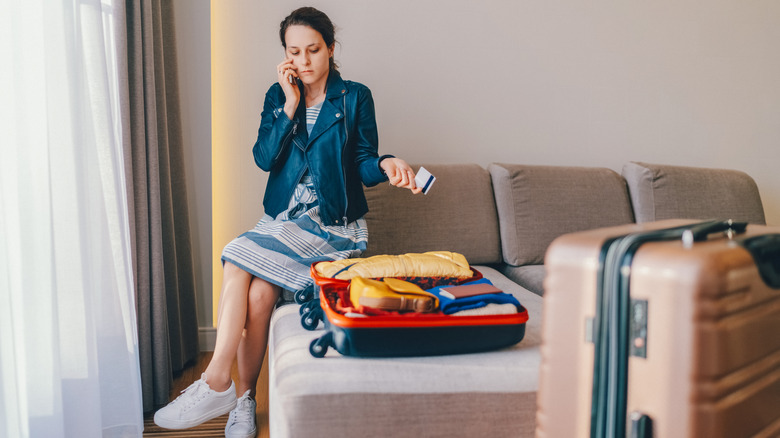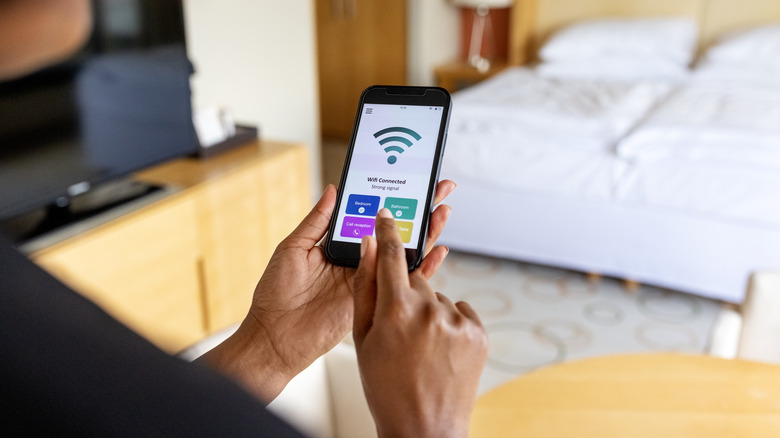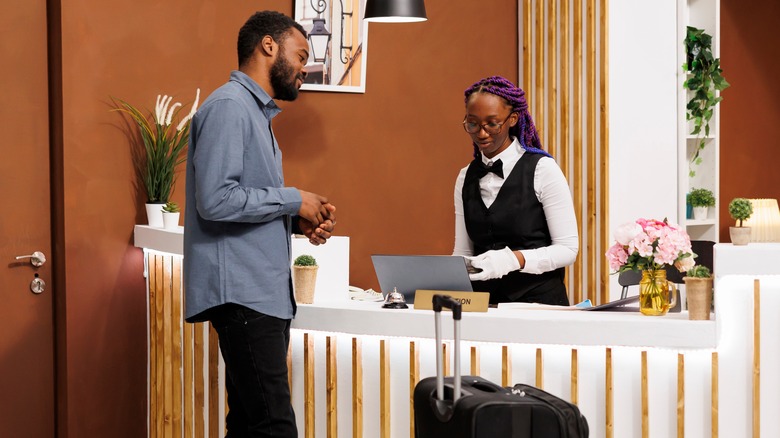Rick Steves And A Travel Safety Expert Warn Of These Frustrating Hotel Scams
Scams are an unfortunate part of traveling that even experienced tourists need to be mindful of. There are airport scams, pickpocket scams, and even hotel scams. Yep, the place you go to unwind and seek comfort at the end of a long sightseeing day isn't immune from swindlers, according to Joanne McNellis Coelho, CEO and founder of Travel Safety Solutions. "While travelers should feel secure at their accommodations, hotels and apartments can unfortunately be common targets for scams," she reveals.
As McNellis Coelho exclusively tells Explore, scams can occur even before you check into your room. "Emails and texts offering upgrades or special promotions are sent to lure travelers into providing their credit card information. These communications can appear very authentic." To avoid getting duped, the travel expert suggests contacting the hotel directly to confirm the legitimacy of any unsolicited messages and never clicking any links until you're sure they're trustworthy.
Scams to watch out for at your hotel
You've just arrived at your hotel and, to get settled in, you look around for the Wi-Fi password. However, you might want to think twice before accessing the hotel internet, says Joanne McNellis Coelho. "One of the most frequent scams involves fake Wi-Fi networks. Scammers create networks with names that closely resemble the hotel's official Wi-Fi, hoping to trick guests into connecting and steal sensitive information like credit card numbers or banking details." To make sure you're using a secure hotel network, it's best to get login details from the front desk and double check the name before hitting "connect."
You should also watch out for the hotel phone scam on your trip. McNellis Coelho explains that during this trick, a caller pretending to be a front desk employee rings your hotel room, claiming there's been a payment issue. Then, they ask for your credit card information to finalize the payment for your stay. "A similar tactic, known as the 'fake menu' scam, targets guests by requesting credit card information for a food order. In both cases, guests should never provide their credit card information over the hotel room phone," urges the expert.
Finally, professional traveler Rick Steves shares another hotel scam on his website, where people impersonating the hotel's room inspectors show up at your door. They usually work in pairs, with one person checking the inside of your room and the other remaining outside. Once you're distracted, they work together to swipe any valuables from your dresser or nightstand. As Steves writes, it's best to never let strangers in your room without confirming their identity with the front desk.
How to protect yourself from scammers
Scammers can be sneaky, but by remaining vigilant and listening to your gut, you can largely avoid tricksters targeting your hotel. Joanne McNellis Coelho suggests calling the hotel or stopping by the front desk if anything feels off. Don't second-guess yourself or worry that you're being a bother. "If something does not sit right with you, trust that feeling. When faced with an unexpected situation, your gut reaction is often the best guide," she adds.
It's also wise to keep your credit card in a safe place and only share your payment details during transactions you're sure are legitimate (such as those done through a trusted app or in person at the hotel reception desk). Additionally, the Travel Safety Solutions founder says to remain alert throughout your trip. "Scammers often target travelers who seem distracted and unfamiliar, so it is important to stay sharp!"
If you think you may have been a victim of a hotel scam, McNellis Coelho recommends contacting the hotel manager right away, providing as much detail as you can. You may also need to get in touch with the hotel's corporate office for guidance. Ultimately, you may decide to reach out to law enforcement to try to catch the criminal or for the purpose of filing a travel insurance claim. To file your case, be sure to get a written report of the incident from the hotel and gather any evidence that may be available.


